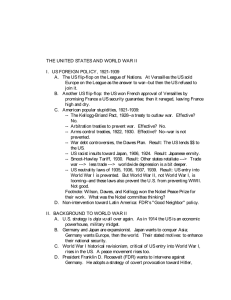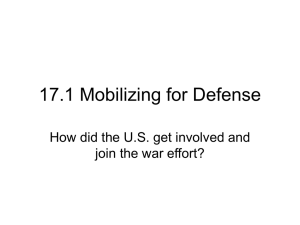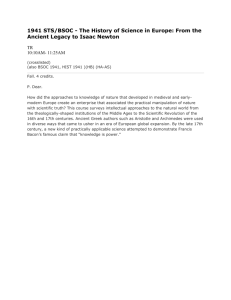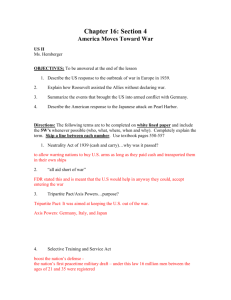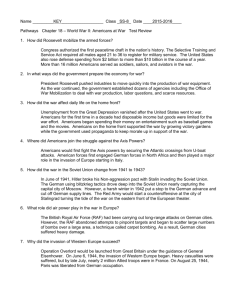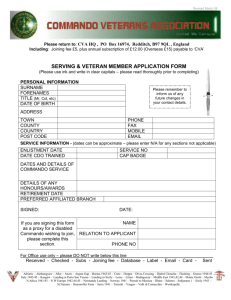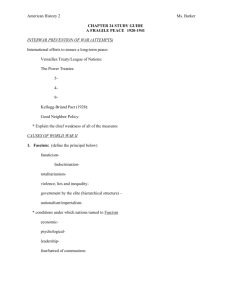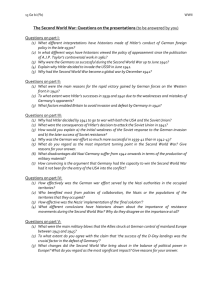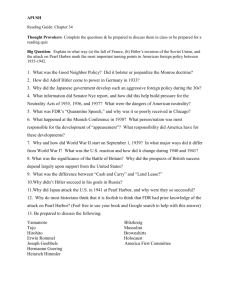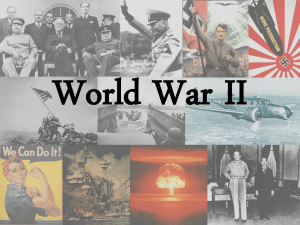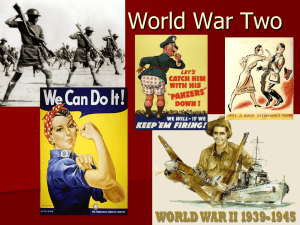THE UNITED STATES AND WORLD WAR II
advertisement
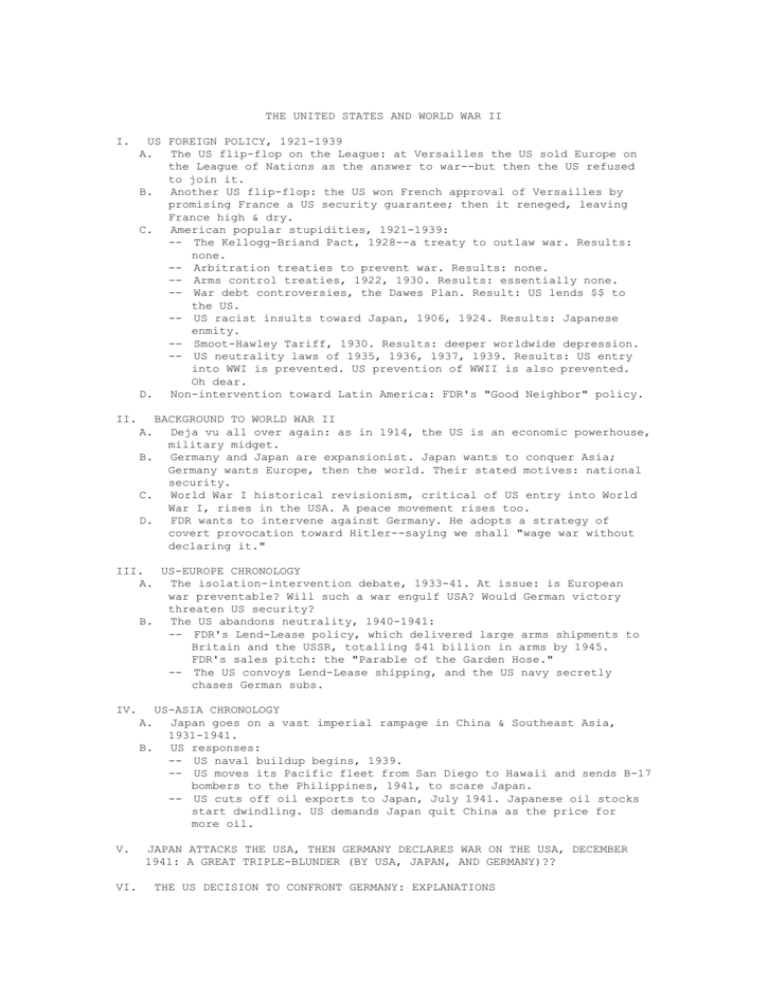
THE UNITED STATES AND WORLD WAR II I. II. US FOREIGN POLICY, 1921-1939 A. The US flip-flop on the League: at Versailles the US sold Europe on the League of Nations as the answer to war--but then the US refused to join it. B. Another US flip-flop: the US won French approval of Versailles by promising France a US security guarantee; then it reneged, leaving France high & dry. C. American popular stupidities, 1921-1939: -- The Kellogg-Briand Pact, 1928--a treaty to outlaw war. Results: none. -- Arbitration treaties to prevent war. Results: none. -- Arms control treaties, 1922, 1930. Results: essentially none. -- War debt controversies, the Dawes Plan. Result: US lends $$ to the US. -- US racist insults toward Japan, 1906, 1924. Results: Japanese enmity. -- Smoot-Hawley Tariff, 1930. Results: deeper worldwide depression. -- US neutrality laws of 1935, 1936, 1937, 1939. Results: US entry into WWI is prevented. US prevention of WWII is also prevented. Oh dear. D. Non-intervention toward Latin America: FDR's "Good Neighbor" policy. BACKGROUND TO WORLD WAR II Deja vu all over again: as in 1914, the US is an economic powerhouse, military midget. B. Germany and Japan are expansionist. Japan wants to conquer Asia; Germany wants Europe, then the world. Their stated motives: national security. C. World War I historical revisionism, critical of US entry into World War I, rises in the USA. A peace movement rises too. D. FDR wants to intervene against Germany. He adopts a strategy of covert provocation toward Hitler--saying we shall "wage war without declaring it." A. III. US-EUROPE CHRONOLOGY A. The isolation-intervention debate, 1933-41. At issue: is European war preventable? Will such a war engulf USA? Would German victory threaten US security? B. The US abandons neutrality, 1940-1941: -- FDR's Lend-Lease policy, which delivered large arms shipments to Britain and the USSR, totalling $41 billion in arms by 1945. FDR's sales pitch: the "Parable of the Garden Hose." -- The US convoys Lend-Lease shipping, and the US navy secretly chases German subs. IV. US-ASIA CHRONOLOGY Japan goes on a vast imperial rampage in China & Southeast Asia, 1931-1941. B. US responses: -- US naval buildup begins, 1939. -- US moves its Pacific fleet from San Diego to Hawaii and sends B-17 bombers to the Philippines, 1941, to scare Japan. -- US cuts off oil exports to Japan, July 1941. Japanese oil stocks start dwindling. US demands Japan quit China as the price for more oil. A. V. VI. JAPAN ATTACKS THE USA, THEN GERMANY DECLARES WAR ON THE USA, DECEMBER 1941: A GREAT TRIPLE-BLUNDER (BY USA, JAPAN, AND GERMANY)?? THE US DECISION TO CONFRONT GERMANY: EXPLANATIONS A. B. US security: balance-of-power arguments, "defense perimeter" arguments. Human rights? No: we remember WWII as the "good war" that ended the Holocaust, but the US was largely unconcerned with human rights in 1940-1941. VII. THE US DECISION TO CONFRONT JAPAN: EXPLANATIONS A. US economic motives? The "China Market." B. US security/geopolitical motives: -- Japan is Germany's ally; "to contain Germany the US must contain Japan." (But in 1941 Japan offers to drop the Axis alliance...) -- "Japan threatens Britain's Asian colonies." (But these colonies were strategic millstones for Britain...) -- "War in Asia is a route to war in Europe"--the "back door to war." (But Asian war could also be a trap door to more and more Asian war while Europe burns.) C. Bureaucratic politics: who authorized the 1941 oil embargo? (Did Dean Acheson act without authorization?) D. The China Lobby? Did it cause the tide of anti-Japanese public opinion in US, 1941? VIII. A. B. IX. A. COULD THE US HAVE PREVENTED WORLD WAR II? Could the US have prevented the war in Europe? Alternative US policies toward Germany: -- Tougher policies? Deter Germany before 1933, or even in 19381939: -- Ally with France, as the US had agreed to do in 1919. Keep some US troops in France, 1919-1941. -- Build up the US military in 1920s (move from a military mobilization strategy to a standing-force strategy); then use this standing force to deter German expansion. -- Softer policies? -- Impose a softer peace in 1919--demand no reparations, take no territory, etc. -- And/or press Britain and France in 1939 to appease Hitler further--let him have Danzig and the corridor (as AJP Taylor later suggested)? -- Clearer policies? Some claim a lack of clear US grand strategy, 1933-1941 led Hitler to underestimate US resistance to future Nazi expansion. Solution: clearly tell the Germans in the 1920s and 1930s that the US will do what it eventually did do in 1941-1945 (that is, smash them if they reach for Eurasian hegemony). Could the US have prevented the war in Asia? Alternative US policies toward Japan: -- Tougher policies? -- Build up US military in 1920s. Move from a military mobilization strategy to a standing-force strategy. -- Use this standing force to deter Japanese expansion in 1931. -- Softer policies? -- Avoid the crisis-management blunders of 1941. -- Don't put US bases in Philippines in 1930s (this threatens Japanese security); don't sent the US fleet to Pearl Harbor, or US B17s to Philippines in 1941 (this both frightens Japan and tempts Japanese preemption). -- Don't embargo US oil shipments to Japan (this compels Japan to seize Indonesian oil). -- Appease Japan in 1941. Let Japan keep China if it agrees to go no further. -- Clearer policies? Some claim a lack of clear US grand strategy, 1933-1941 led Japan to underestimate US resistance to future Japanese expansion. Solution: clearly tell Japan in 1931 or 1937 that the US will do what it eventually did do in 1941-1945. EVALUATING US ENTRY INTO WORLD WAR II: A GOOD IDEA? US security rationales for fighting Germany--valid? (Or could the US B. C. X. have avoided the war by just staying home?) -- Would German hegemony in Europe have threatened US sovereignty? -- Was US intervention necessary to prevent German hegemony? -- Could the US stop Germany without allowing Soviet near-hegemony? US security rationales for fighting Japan--valid? Was the Pacific war a strategic necessity or almost a vast diversion? Effects of US entry: -- On global balances of power? -- On human rights? (Millions of lives were probably savedessentially by accident.) US CONDUCT OF WORLD WAR II: SIX CONTROVERSIES A. Was another European military strategy better? E.g., invade the European continent in 1943, and race to Berlin & points East? Or, invade Europe through the Balkans and race into Eastern Europe? B. Demand Stalin foreswear East European empire in exchange for LendLease? C. Make a separate peace with Germany? D. Reach a clear spheres-of-influence agreement with Stalin? E. Air war controversies: Bomb Auschwitz? Also, don't firebomb Dresden, Tokyo, Yokohama; don't A-bomb Hiroshima, Nagasaki? Some facts: U.S. bombs killed 900,000 Japanese civilians during March-August 1945-twice the total U.S. combat deaths in all U.S. wars since 1776. The March 1945 firebomb raid on Tokyo killed 83,000 Japanese--more than U.S. losses in Vietnam and Korea combined. A grisly tale. F. What do to with Germany? Pastoralization vs. partition vs. disarmament vs. neutralization vs. (de)brainwashing the German people.
